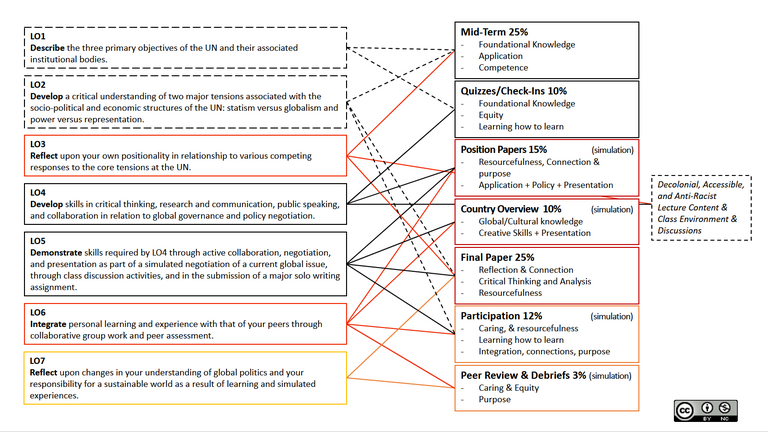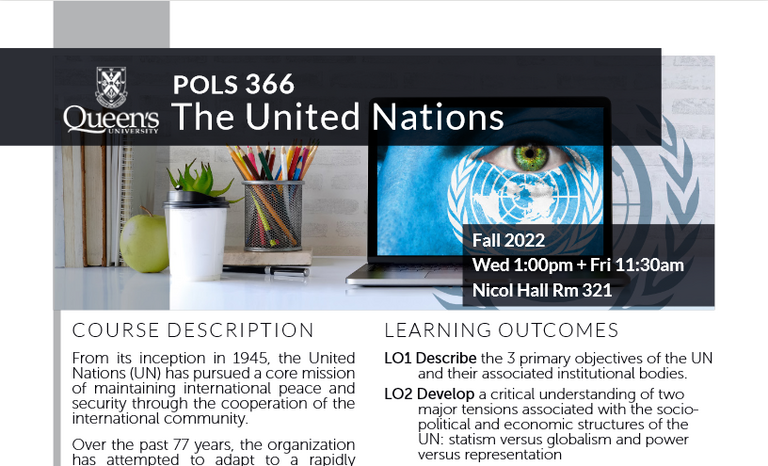A key element of global engagement in teaching and learning is the development of globally engaged curricula. To support educators across disciplines in envisioning how this might take shape within their subject field, the Centre for Teaching & Learning (CTL) has created the following resources for ideas, options, and inspirations.
Sections:
- Working Definition of Globally Engaged Curriculum
- Weaving global Engagement into Curricular Work
- Other Resources for Globally Engaged Curriculum
- Globally Engaged Curriculum Exemplar Courses
Working Definition of Globally Engaged Curriculum
In collaboration with the VP Global Engagement Office, the CTL has developed a working definition of globally engaged curriculum to serve as a foundation for ongoing evolvement.
A Globally Engaged Curriculum, at Queen’s University, reflects broader global and intercultural perspectives in content, learning outcomes, assessment, and instructional strategies. It intentionally engages students with diverse worldviews and ways of knowing to question and disrupt dominant western-centric knowledges, pedagogies, and research practices. A Globally Engaged Curriculum commits to cultural humility, anti-racism, decolonial education, and accessibility in a holistic manner that holds both educators and students accountable. It advocates for the contributions of globally diverse values and practices, and inspires innovative, equitable, and impactful research.
The ultimate goal of reorienting curriculum for global engagement is to foster global understandings and experiences in Queen’s classrooms. Through this, students will not only develop competencies to work effectively across cultural contexts but also demonstrate social responsibility to contribute both locally and globally using equitable approaches.
Reorienting curriculum for global engagement fosters classrooms where students:
- develop the ability to work effectively across cultural contexts
- deepen global and intercultural understanding, and
- practice social responsibility by contributing to both local and global communities through equitable approaches.
A globally engaged curriculum invites educators and students to work together through out a course to:
- critically examine dominant Western (Anglo-and Euro-American) ideologies, epistemologies, and methodologies within the discipline
- affirm and integrate diverse ways of being, thinking, and doing
- highlight globally diverse values and practices in the subject area
- connect local and global perspectives in addressing real-world challenges equitably
To clarify this definition, a globally engaged curriculum is built on three pillars, guided by four core values, and enacted through two-fold tasks as illustrated in the graphics.
| Three Pillars | Four Core Values | Two Folds | |
|---|---|---|---|
 |
 |
 |
 |
It provides opportunities for educators and students to work together through out a course to:
- question Western (Anglo-and Euro-American) ideologies, epistemologies, and methodologies that dominate the subject
- support diverse ways of being, thinking and doing
- showcase globally diverse values and practices in the subject and/or discipline
- connect local to global in terms of solving real-world issues
Weaving Global Engagement into Curricular Work
Globally engaged curricula can take many forms, reflecting the diverse goals, disciplines, and contexts of courses at Queen’s. To support educators in integrating global perspectives into their teaching, the CTL draws on Wiggins and McTighe’s (1998) backward design alongside Leask’s (2015) approaches to curriculum internationalization, offering both inspiration and practical guidance.
Backward Design
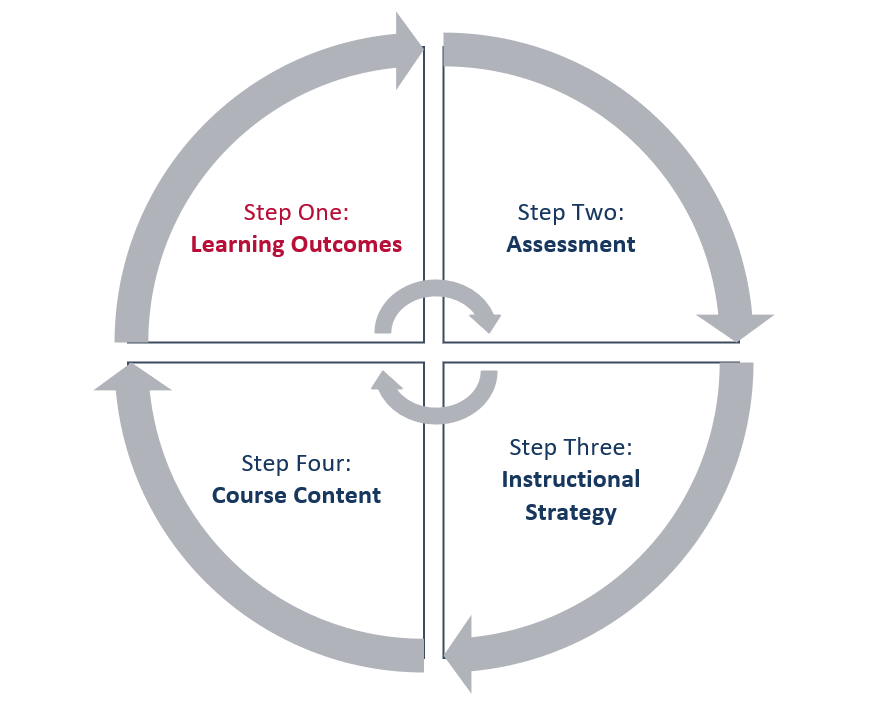
Step 1: Identify the expected learning outcomes: What should students know and/or be able to do by the end of the course?
Step 2: Determine learning evidence: What assessments will help students demonstrate whether they have achieved the learning outcomes?
Step 3: Plan learning experiences: What instructional strategies and/or learning activities will enable students to achieve the learning outcomes?
Step 4: Choose course content: what readings, materials, and resources will help students successfully achieve the learning outcomes?
Read another example of backward design.
Approaches to Globally Engaged Curriculum
Adapted from Leask (2015), there are three approaches to develop globally engaged curriculum: ‘add-on’, ‘curricular infusion’, and ‘transformation’. Add-on, compared with the other two approaches, is easier for educators to implement as it asks for no fundamental changes in course design. Through this approach, educators can add one reading or plan one activity that reflects different cultural or global perspectives in their course. Transformation, on the other hand, expects educators to shift in cultural perspectives and move among different cultures and worldviews. This approach better applies to subjects that are deeply embedded in intercultural practices and knowledges.
‘Curricular infusion’ is the approach the CTL recommends for developing globally engaged curriculum. This approach requires educators to rethink and reorient their course design through incorporating intercultural or global perspectives into the steps of backward design. The first and foremost step is to identify the overall course goals and expectations for global engagement, in which educators need to go beyond merely focusing on knowledge and content but take other essential aspects of teaching and learning into consideration. Then specify these goals and expectations into learning outcomes that drive the design of assessment, planning of learning activities, and consideration of which content to use or not use.
Holistic Framework for Globally Engaged Curriculum
To help educators further navigate the approach of curricular infusion, the CTL has created a holistic framework as a concept map to guide the process of developing globally engaged curriculum, beginning with learning outcomes.
.png)
The holistic framework for globally engaged curriculum, developed by Yunyi Chen, (in consultation with Lindsay Brant, Educational Developer-Indigenous Curriculum and Ways of Knowing, CTL and Aaron St. Pierre, Associate Director, Office of Indigenous Initiatives) Educational Developer-Program and Curriculum Globalization Centre for Teaching & Learning, Queen’s University, is shared under a Creative Commons Attribution-NonCommercial 4.0 International License (CC BY-NC).
As Yunyi Chen comes from a cultural background where holism is valued and respected, she has a particular appreciation for Indigenous knowledges and pedagogies such as the Four Directions Teachings and the Medicine Wheel. Both guide her to practice her work in a holistic manner by incorporating emotional, physical, mental, and spiritual ways of thinking and doing. She is committed to incorporating Indigenous knowledges and pedagogies in her work to decolonize her practice of educational development. In consultation with Lindsay Brant, Educational Developer-Indigenous Curriculum and Ways of Knowing at the CTL and Aaron St. Pierre, Associate Director at OII, Yunyi developed this holistic framework to help educators create globally engaged curriculum through a holistic and decolonizing approach.
The Medicine Wheel originates from Anishinaabe culture and tradition. This Indigenous knowledge is used with respect and appreciation in this framework for educational purposes. It remains the cultural property of the Indigenous Peoples with whom they originate.
This framework is composed of four layers. At the centre lies the four core values of globally engaged curriculum defined by the working definition. Decolonization is the heart reified through practices of cultural humility, anti-racism, and accessibility.
The second layer is built around the Student Success Framework adapted from Lizzio (2006), as the primary tasks and missions of higher education are to enhance student success in both local and global contexts. This is where educators navigate their overall course goals and expectations, while taking into consideration student success factors.
The third layer is adapted from Dee Fink’s (2013) Taxonomy of Significant Learning, which highlights essential components of teaching and learning that are oftentimes overlooked in higher education, such as ‘caring’, ‘human dimension’, and ‘learning how to learn’. This layer helps educators transform their overall course goals and expectations into learning outcomes through reflecting on critical questions that challenge the dominant ideology, epistemology, and methodologies prevalent in practices of teaching and learning.
The last layer, also the foundation of this framework, is the Medicine Wheel. This layer ensures that educators cover all four important aspects of teaching and learning in their development of learning outcomes and the associated curriculum in terms of emotional, spiritual, physical, and mental ways of thinking and doing.
Following this framework, educators can focus on student success in their curriculum development that goes beyond delivering knowledge and content. In addition, they can situate their curriculum and practice of work in a decolonizing context by decentering what has been dominant in teaching and learning and instead centering diversity in rationales, strategies, approaches, and activities (Jooste & Heleta, 2017).
To learn more about the holistic framework, read ‘Developing Globally Engaged Curriculum’ (PDF, 294KB).
To apply the holistic framework in your practice of work, use the worksheets: Developing Globally Engaged Learning Outcomes (Word, 78KB) and Learning Outcomes and Assessment Alignment (Word, 81KB).
For any question about globally engaged curriculum, please feel free to contact CTL at ctl@queensu.ca for a consultation or conversation.
Other Resources for Globally Engaged Curriculum
The Global Learning Matrix (PDF, 192KB) is a tool for instructors and departments to focus their learning outcomes while developing curricula and programs for global engagement. As the diagram illustrates, this matrix comprises four key components—Multiple Perspectives, Intercultural Competence, Social Responsibility, and Global Challenges—that interact and build upon each other to engage students in meaningful global learning experiences during their time at Queen’s University.
Intercultural competence is often a primary focus of global learning initiatives. To specifically address this need, the Intercultural Competence Matrix (PDF, 245KB) has been created to delve further into this aspect of the Global Learning Matrix. The Intercultural Competence Matrix addresses five key areas that support students in developing robust self-awareness, attitudes, and knowledge to communicate and engage effectively and equitably in a global context.
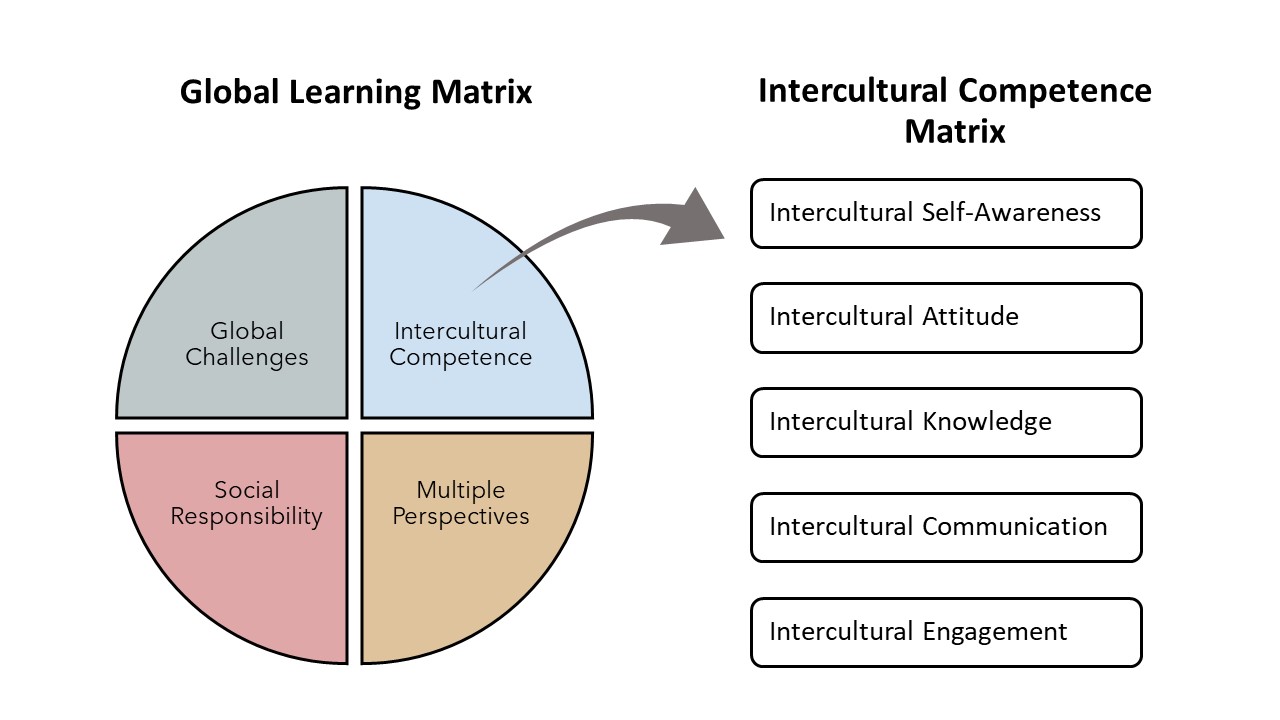
Please note that these two resources are intended as catalysts for inspiration and a framework for your development efforts. Feel free to employ these tools creatively and flexibly to develop learning outcomes that effectively meet the unique needs of your students in global learning. Should you have any inquiries or require further assistance, the Centre for Teaching & Learning (ctl@queensu.ca) is here to support you.
Bond, S. (2003). Engaging educators: Bringing the world into the classroom. Canadian Bureau of International Education (CBIE): Ottawa.
Chen, Y. & Brant, L. (2022 February). Framing Pedagogy of Peace in the Context of Student Success [workshop]. Centre for Teaching and Learning, Queen’s University
Chen, Y., & Fontaine, L. (2019 November) wiingashk (sweet grass): Braiding into Inclusive Education. [workshop]. Centre for the Advancement of Teaching & Learning, University of Manitoba
Fink, L. Dee. (2013). Creating Significant Learning Experiences: An Integrated Approach to Designing College Courses. San Francisco: Jossey-Bass.
Leask, B. (2015). Internationalising the Curriculum. Abingdon: Routledge.
Lizzio, A. (2006). Designing an orientation and transition strategy for commencing students: Applying the five senses model.
Jooste, N. & Heleta, S. (2017) Global Citizenship Versus Globally Competent Graduates: A Critical View From the South. Journal of Studies in International Education, 21 (1), 39-51.
Globally Engaged Curriculum Exemplar Courses
The CTL would like to showcase how some instructors across disciplines have creatively and innovatively integrated global engagement in their curriculum. This space is a work in progress and will be continually updated to celebrate the great work from our teaching community. We hope the exemplar courses inspire you to start making changes in your own course for global engagement, and we look forward to collaborating with individual educators and the departments at Queen’s in this exciting endeavour. Please feel free to reach out to us at ctl@queensu.ca We are here to support you.
Exemplar One: POLS 366
...the most amazing part of this journey was seeing how re-framing and re-organizing my existing structure could enhance the course development and delivery. I highly recommend my colleagues who are in teaching role here at Queen' taking on this journey to make your courses more globally engaged for student success.
Samantha Twietmeyer, Instructor of POLS 366 - The United Nations
My name is Samantha Twietmeyer and I’ve been teaching in the Department of Political Studies at Queen’s University for about four years. I love teaching and I am committed to including a diverse set of perspectives in my courses, both in terms of diverse local perspectives as well as global sources. However, I found the courses I taught lacked intentionality in terms of delivering these diverse perspectives to the students. Although the United Nations course (POLS 366) seems to naturally lend itself to globally engaged discussions, it is just as easy to find myself stuck in the traditional discourses while trying to steer my class successfully through a semester.
I was excited to work with Yunyi Chen, an Educational Developer at the Centre for Teaching & Learning (CTL), on my syllabus of POLS 336 this year to include more intentionality around global engagement within this course. This meant, for example, reorienting my learning outcomes to focus student learning on global learning and experiences through the active simulation component and scaffolded reflections. The Holistic Framework for Globally Engaged Curriculum Yunyi developed allowed me to break apart my usual course elements and discover how they fit together more logically to produce a course which engages students in consideration of their own positionality in the subject, and responsibilities in solving real-world issues. Moreover, I am confident that the integration of globally engaged learning is now being made clearer for my students than it has been in the past. The clear intentionality of activities and learning outcomes that promote globally engaged learning allows for students to take control of their own learning experience and better understand how to take the course learning beyond the classroom into their own lives and communities.
Besides a few moments when I discarded some older course elements for new and innovative ideas, the most amazing part of this journey was seeing how re-framing and re-organizing my existing structure could enhance the course development and delivery. I highly recommend my colleagues who are in a teaching role here at Queen’s taking on this journey to make your courses more globally engaged for student success.
The graphics below demonstrate some of my process for applying the Holistic Framework for Globally Engaged Curriculum to my United Nations course wile I was preparing it for the Fall 2022 Semester.
I utilised the backwards-design strategy to work through my course elements:
- Step 1: Learning Outcomes
- Step 2: Assessment Design
- Step 3: Weekly Planning
You can use the gallery to learn about how I used Microsoft PowerPoint to apply each step of the strategy. Simply select any images to open the gallery style interaction/
You can download all three components as a PDF: POLS Engagement Planning (PDF, 163KB)
All graphics are copyright Samantha Twietmeyer, Teaching Fellow/PhD candidate at the Department of Political Studies, Queen’s University, and are shared under a Creative Commons Attribution-NonCommercial 4.0 International License.




For possibly obvious reasons, the Sustainable Development Goals (SDGs) have been a core part of the United Nations course since its first delivery. At minimum, there is a lecture day dedicated to the SDG framework as it is a core piece of UN development architecture. The SDGs are also one of the course components where the class examines global financial structures, as well as the tension between global and state-level commitments and the concept of shared but differentiated responsibility. Additionally, the SDGs are part of the Simulated Negotiation component. Students are required to draft resolution clauses which reflect or otherwise cite one or more SDGs. It is a requirement of their Position Papers to demonstrate how their recommendations reflect actions on SDGs.
This year’s (2022) simulation is going to specifically reflect the priorities of the Economic and Social Council (ECOSOC) which is one of the core UN bodies tasked with oversight on the SDGs. As a result, I have planned a pre-simulation activity on the SDGs to help my students develop a stronger grasp of the various commitments and the key actors involved before they head into the Simulation component.
POLS366 Magazine Syllabus (PDF, 1.3MB)
I also developed the Magazine-Style Syllabus to display all essential course components in a summary fashion that is more engaging than the standard long-form syllabus document. Components like the course reading lists or assessments and associated deadlines can be printed out easily on a single page for quick reference. For the purpose of multiple access, students are also provided a standard course-syllabus that provides even greater guidance and detail.
All syllabus content is provided again in onQ and students are advised that the most up-to-date syllabus content is to be found through onQ in the case of discrepancies or alterations.
Exemplar Two: BLCK 380
It was a rewarding experience to work on BLCK 380 for global engagement. As an instructor, I was inspired to think further about my approach to teaching, pedagogical development, and student mentorship… I would recommend my fellow instructors and members of Queen’s teaching community to join this collective effort to develop globally engaged curriculum to reflect the nature and scale of the challenges facing humanity and the diversity and lived experiences of our student body.
Kesha Fevrier, Instructor of BLCK 380 - Black Environmental Ecologies: A Global South Perspective
My name is Kesha Fevrier, and I am an Assistant Professor in the Department of Geography and Planning. To address major global challenges, such as the climate crisis, increasing food insecurity, war, conflict and displacement, the debt burdens of poor countries, public and environmental health effects of resource extraction, and hazardous waste management, I embarked on the journey to design BLCK 380 - Black Environmental Ecologies: A Global South Perspective – as part of the Black Studies minor. While these issues are global in scale, they have an outsized impact on countries in the global South and their racialized populations.
Given the focus of this course and my intention to situate Black studies in a global context, I collaborated with Yunyi Chen, an Educational Developer at the Centre for Teaching and Learning (CTL), to make BLCK 380 a globally engaged course using the Holistic Framework for Globally Engaged Curriculum. Through this process, I intend to set students up to appreciate diverse perspectives (even those they don’t agree with), practice cultural humility, anti-racism, and decolonization in their interactions with peers (from all backgrounds) and engage equitably with the wider community. This collaboration also provided me with a great opportunity to rework my course syllabus to ensure better alignment between the course learning outcomes, assessments, grading rubrics, and instructions.
It was a rewarding experience to work with Yunyi on BLCK 380 for global engagement. As an instructor, I was inspired to think further about my approach to teaching, pedagogical development, and student mentorship. For students, the inclusive and engaging environment this course aims to establish, will increase their interest in the learning process and the academic fields within which their research unfolds. I would recommend my fellow instructors and members of Queen’s teaching community to join this collective effort to develop globally engaged curriculum to reflect the nature and scale of the challenges facing humanity and the diversity and lived experiences of our student body.
The graphics below demonstrate the course learning outcomes, assessments, and their alignment in light of the Holistic Framework for Globally Engaged Curriculum. I also included the course outline as I will teach this course in the Winter 2023 semester.
The graphics, copy right Kesha Fevrier, Assistant Professor at the Department of Geography and Planning, are shared under a Creative Commons Attribution-NonCommercial 4.0 International License. You can download them as a PDF: BLCK 380 Planning (PDF, 150KB).


BLCK 380 Course Syllabus (PDF, 1.5MB)
This course syllabus (copyright Kesha Fevrier, Assistant Professor at the Department of Geography and Planning, Queen’s University) includes all course components for detailed information, and is shared under a Creative Commons Attribution-Non Commercial 4.0 International License. This syllabus can be downloaded by students in onQ where all readings required in this course can be accessed.
Exemplar Three: MUSC 210
“In a time when the world seems smaller than ever, but sadly more divided than ever, embedding appropriate types of global engagement in perhaps all of our teaching is needed more than ever. Exploring ways to do this… is an experience I recommend for everyone.”
Margaret Walker, Instructor of MUSC 210 – Western Art Music: Crusades to Colonialism
Dr. Margaret Walker, Professor, Dan School of Drama and Music
As a music scholar, teacher and performer educated in Western classical piano, Indian classical dance, ethnomusicology, and music history, I have long found that what I want to teach doesn’t fit in the neat curricular boxes of the standardized Bachelor of Music degree offered at so many Canadian universities. A central problem is the separation of what is often called Western Classical Music from all other types of music in the world. The colonial, racist, and classist values implicated by this separation are something that I have been struggling against for a long time. I was therefore absolutely delighted to participate in Yunyi Chen’s (an Educational Developer at the Centre for Teaching and Learning) workshop on “Developing Globally Engaged Curriculum: Why, What & How” in May 2022 and jumped at the chance to work one-on-one with Yunyi to redevelop one of my music history courses.
This course, MUSC 210, is currently entitled Western Art Music: Crusades to Colonialism (will be retitled “Crusades to Colonialism: Musical Encounter 1000-1800”), and although its title indicates a somewhat globalized framework, it focuses largely on the chronological history of Western Classical music and composers. I have, through four years of teaching it, increasingly shifted it towards critical historiography (urging my students to ask where this story came from) and moments of global content, but I knew it had potential I had yet to figure out! The holistic framework developed by Yunyi not only offered a comprehensive combination of core values, student success, and significant learning outcomes, it places these in the framework of the Anishinaabe Medicine Wheel. Using the holistic framework both validated the changes I was already moving strongly towards and provided a unique and very helpful method to approach my vision of this course.
Although my biggest takeaway from the noted workshop is the phrase and concept of “cultural humility,” in a broader sense the truly holistic framework is the real treasure here. With the fundamental core values of decolonization, anti-racism, accessibility, and cultural humility at the centre and the four directions of the medicine wheel around the outside, this framework puts “frequently used” learning goals like foundational knowledge and competence in conversation with often unseen goals such as caring, educational equity, and learning how to learn. Working with Yunyi helped me see how to include these essential but less quantifiable aspects in both learning outcomes and assessments.
In a time when the world seems smaller than ever, but sadly more divided than ever, embedding appropriate types of global engagement in perhaps all of our teaching is needed more than ever. Exploring ways to do this, using the holistic framework with Yunyi’s support is an experience I recommend for everyone.
The graphic below depicts Margaret’s vision of Wholistic Music Studies through incorporating Positionality, Cultural Humility, and Knowledge Production into the curriculum to enact I-EDIAA and global engagement.

This graphic demonstrates the new learning outcomes Margaret developed for MUSC 210 and how they align with assessments in light of the Holistic Framework for Globally Engaged Curriculum.
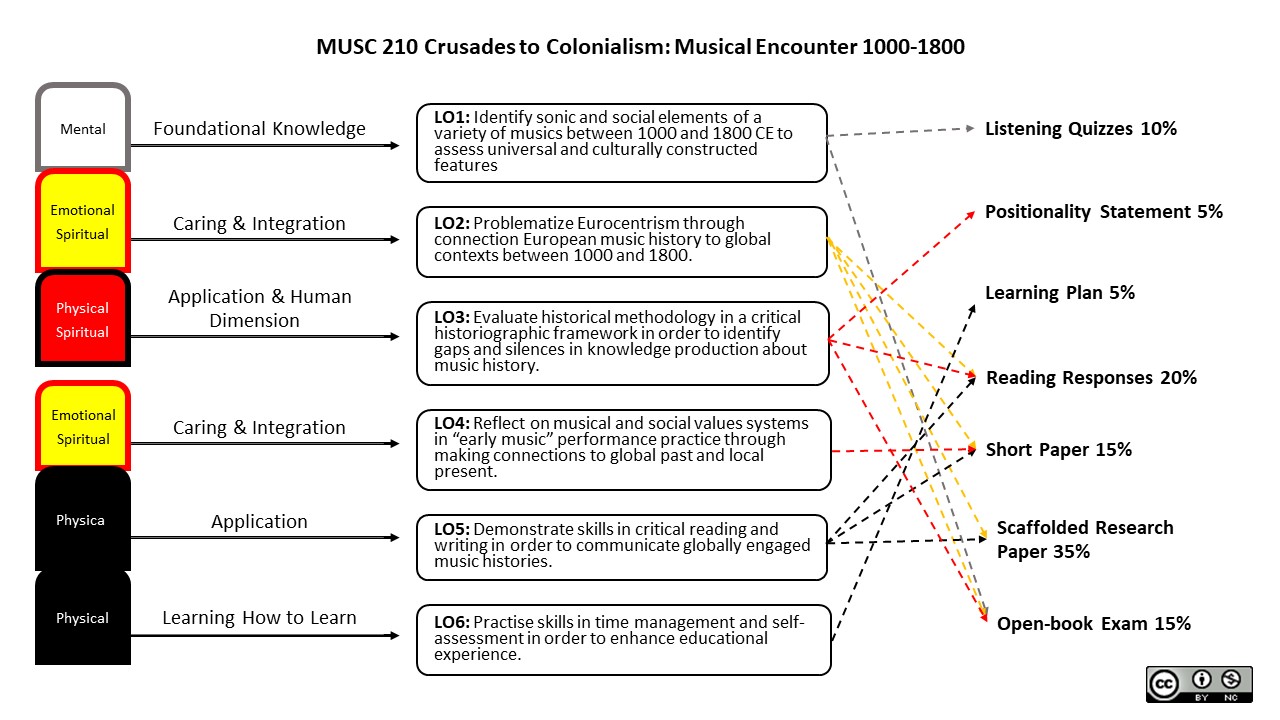
The graphics, copy right Margaret Walker, Professor at DAN School of Drama and Music, Queen’s University, are shared under a Creative Commons Attribution-NonCommercial 4.0 International License. You can download them as a PDF: MUSC 210 Graphics (PDF, 100KB).
MUSC 210 Course Syllabus (PDF, 394KB)
This course syllabus, copyright Margaret Walker, Professor at DAN School of Drama and Music, Queen’s University, is shared under a Creative Commons Attribution-Non Commercial 4.0 International License. This syllabus can be downloaded by students in onQ where all readings required in this course can be accessed.
Exemplar Four: SOCY 458
“With reorientation to global engagement, this course is both appealing to students and exciting to teach. The weekly schedule shows students the range of inquiry both locally and globally… Students are invited to explore global themes while appreciating diverse perspectives on law, practising cultural humility, and considering their responsibility and potential to effect meaningful changes in the world… I encourage my colleagues teaching at Queen’s to embrace the challenge and create globally engaged courses that prepare students to be socially responsible, ethical, and globally competent graduates.”
Fiona Kay, Instructor of SOCY 458 – Law & Ideology
Dr. Fiona Kay, Professor, Department of Sociology
My name is Fiona Kay, and I am a professor in the Department of Sociology. Over the years, I have taught sociology of law as a fourth-year seminar class. In recent years, I began to introduce more readings from outside the North American context. Students told me how learning about law in different countries helps shape their understanding of Canadian law. One of the best features of this course is that students, from an array of cultural and national backgrounds, participate actively in discussions and the class environment is richer for these contributions. I was excited to re-imagine SOCY458 as a course that would foster discussions about law and its impact in a global context.
The potential for collaboration happened when I met Yunyi Chen, an Educational Developer at the Centre for Teaching and Learning (CTL). We were working together on strategies to generate engagement in large lecture theatre courses (post-Covid pandemic), when Yunyi drew my attention to SOCY458. Yunyi saw the potential for this course to be reoriented using the Holistic Framework for Globally Engaged Curriculum. I was thrilled to have an educational developer on board with an impressive toolkit of ideas.
With reorientation to global engagement, this course is both appealing to students and exciting to teach. The weekly schedule shows students the range of inquiry both locally and globally, including: Indigenous law in Australia and Canada; racial persecution through Chinese exclusion laws in the U.S. and internment of “enemy aliens” during wartime in Canada; law’s power over gender through abortion, anti-female genital mutilation/cutting, and marriage laws; the role of the United Nations and International Criminal Court in addressing human rights violations; as well as global social movements dedicated to labor activism and climate change. The course also explores how people understand the law, ideals of procedural justice, religion’s relationship with law, and when and how law is mobilized in daily life in different national contexts. Students are invited to explore global themes while appreciating diverse perspectives on law, practising cultural humility, and considering their responsibility and potential to effect meaningful changes in the world.
One of the rewards of working with Yunyi Chen is the attention she devotes to building a globally engaged course that is cohesive from start to finish. We made the weekly topics intentional by identifying global themes that are evidenced through a variety of national instances (e.g., readings from over twenty countries). We built in supports for each assignment and these are outlined in the syllabus. Students can easily see what the course offers through learning outcomes that are both relevant and encouraging and that align with manageable assessments (The tools shared by Yunyi have transformed all the courses I teach). I encourage my colleagues teaching at Queen’s to embrace the challenge and create globally engaged courses that prepare students to be socially responsible, ethical, and globally competent graduates.
The graphics below demonstrate my process for applying the Holistic Framework for Globally Engaged Curriculum to SOCY458 Law and Ideology.
I used a foundations-up strategy to work through my course elements:
- Step 1: Identify key global themes (foundations) in the subject field and contemporary research articles across national boundaries.
- Step 2: Generate learning outcomes (LOs) informed by the holistic framework.
- Step 3: Design assessments with supports in place to enhance student success.
- Step 4: Align learning outcomes with assessments and make changes as needed to ensure clear alignment.
- Step 5: Plan weekly schedule of topics and related readings based on the LOs and assessment.
- Step 6: Re-imagine syllabus with graphics, phrasing and formatting that is clear and inviting to students.
_Page_1.jpg)
_Page_2.jpg)
Please Note, the graphics, copy right Fiona Kay, Professor at the Department of Sociology, Queen’s University, are shared under a Creative Commons Attribution-NonCommercial 4.0 International License. You can download them as a PDF (177KB)
SOCY 458 Course Syllabus (PDF, 436KB)
This course syllabus, copyright Fiona Kay, Professor at the Department of Sociology, Queen’s University, is shared under a Creative Commons Attribution-Non Commercial 4.0 International License. This syllabus can be downloaded by students in the course onQ site where all readings required in this course can be accessed.
“I reoriented the course to engage students from diverse backgrounds, using globally relevant case studies to motivate students to complete the considerable workload required to develop competency. I think that the course has improved dramatically, but there is a lot more work to do to make coding and statistics more accessible and inclusive. If this is true for a course that teaches coding and statistics, it’s probably true of just about any STEM course!”
Robert I. Colautti, Instructor of BIOL 343 – Advanced Data Analysis for Biologists
Dr. Robert I. Colautti, Associate Professor, Department of Biology
I’m an Associate Professor in the Biology Department where I lead a group of diverse researchers on projects funded from a variety of sources, including CFI, NSERC, CIHR, and a multidisciplinary research grant from SSHRC (see EcoEvoGeno.org and myLyme.ca). I started my first faculty position Queen’s University as a Canada Research Chair in 2015, the same year that the Truth and Reconciliation Commission (TRC) released its 94 Calls to Action. I was reflecting on my own positionality and responsibilities as an educator-mentor-researcher while I was developing resources for teaching coding, statistics, and machine learning to biologists who lack training in computer science and mathematics.
In bridging these disciplines, it was impossible not to notice the stark underrepresentation of women in computer science and people of color in biology. STEM education can be blind to the oppressive social structures, historical inertia, and cognitive biases that determine which voices and ideas are elevated. One obvious example is the eugenics research of the early 20th century, which continues to serve as statistical tools to fuel racism and discrimination, disguised as science. These methods are still taught in many STEM programs (e.g., distributions, ANOVA, p-values). These tools were developed to elevate the study of a European colonialist brand of eugenics, yet most introductory statistics textbooks have decided not to teach this history. As a result, students in STEM miss out on valuable lessons about the subjectivity of objectivity, meritocracy myths, the fallibility of concise models, cognitive biases, and the many other ways that blind adherence to equations and algorithms can reinforce the politics of exclusion, disguised as a ‘focus on the facts’.
As I started revising my introductory textbook “R Crash Course for Biologists” to include this forgotten history, I learned about the Holistic Framework for Globally Engaged Curriculum developed by Yunyi Chen here at Queen’s University. Working with Yunyi has been a great experience that expanded the original scope of one book chapter to encompass my entire BIOL 343 course. We reoriented the course to engage students from diverse backgrounds, using globally relevant case studies to motivate students to complete the considerable workload required to develop competency. I’m looking forward to receiving feedback from the first cohort of students to benefit from this globally engaged curriculum in the Fall 2024 semester. I think that the course has improved dramatically, but there is a lot more work to do to make coding and statistics more accessible and inclusive. If this is true for a course that teaches coding and statistics, it’s probably true of just about any STEM course!
The graphic below illustrates some highlights of BIOL 343 Advanced Data Analysis for Biologists, including the United Nations Sustainable Development Goals (SDGs) incorporated into this course and the learning outcomes in light of the Holistic Framework for Globally Engaged Curriculum.
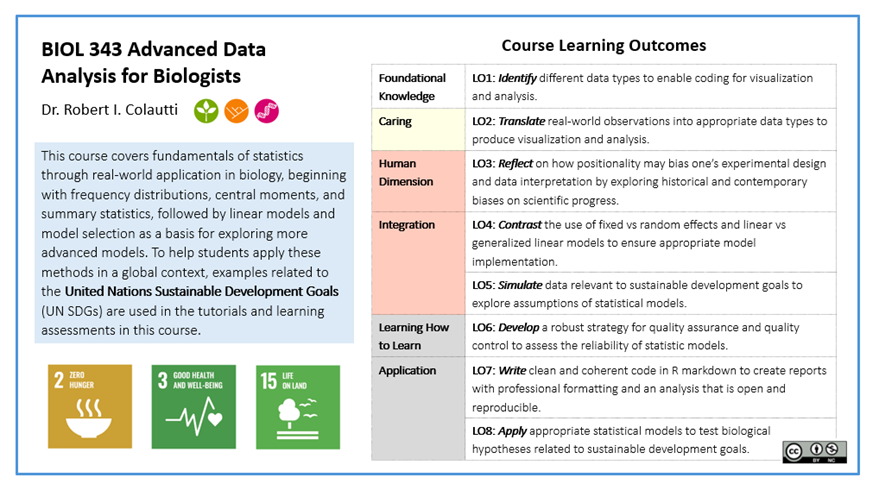
Please Note, the graphic, copy right Robert I. Colautti, Associate Professor at the Department of Biology, Queen’s University, is shared under a Creative Commons Attribution-NonCommercial 4.0 International License. You can download it as a PDF: BIOL 343 Graphic (PDF, 146KB).
BIOL 343 Course Syllabus (PDF, 235KB)
This course syllabus, copyright Robert I. Colautti, Associate Professor at the Department of Biology, Queen’s University, is shared under a Creative Commons Attribution-Non Commercial 4.0 International License.
“Ultimately, in a field that can become really mired in norms of whiteness and western medicine, developing a globally engaged course felt like an important part of my pedagogical praxis... While I was lucky enough to have a course that really lent itself to this work, I truly believe that… globally engaged curriculum more broadly, can be applied to any course in any department. The work of engagement, critical thought, and care is the root of both learning and teaching, and I would encourage any of my colleagues to consider re-orienting their course towards global engagement as a way to move towards these values.”
Megan Ingram, Instructor of HLTH 404 – Global Studies of Social Inclusion, Community Participation and Mental Health
Megan Ingram, Teaching Adjunct, School of Kinesiology and Health Studies
My name is Megan Ingram and I have been teaching as a Teaching Adjunct in the School of Kinesiology and Health Studies (SKHS) here at Queen’s, as well as co-instructing in the Department of Gender Studies at the University of Victoria. Teaching is one of the most fulfilling aspects of my life, and I am particularly committed to accessible education, with accessibility conceptualized broadly–encompassing both prioritizing and centering disability and neurodivergency, but also elements of cultural and financial access. I had the benefit going into this process of being hired by SKHS to develop out a main campus version of HLTH 404: Global Studies of Social Inclusion, Community Participation, and Mental Health. The title and content of the course, as well as having an entirely blank slate lent itself well to being able to innovate and centre access and global engagement from the very beginning.
I had been fortunate enough to meet Yunyi Chen during my time working as a Disability Justice Research Fellow with the Centre for Teaching and Learning some years prior, and so was delighted to enter into collaboration with her and benefit from her incredible insights around global engagement. While I had the big picture vision of what I wanted the course to look and feel like, Yunyi was able to really provide me with the actionable steps and building blocks to make that vision a reality. In particular, Yunyi’s model and worksheet Developing Globally Engaged Learning Outcomes, and her help aligning those outcomes with assessment pieces was indispensable in the development process. This collaboration ultimately allowed me to create a course that used global engagement to centre disability in a way that moved beyond eurocentrism and accounted for the diversity of not just bodies, but how bodies are conceptualized culturally, something I believe will positively impact my student’s healthcare practices to come.
For me, embracing global engagement was a holistic approach to course development, which encompassed learning outcomes, assessment pieces, and content (both topic and who is included in the syllabus). Thus, while I taught explicitly on the intersections of mental health and migration, transnationalism, race, and border practices, amongst others, this content was elevated by an approach to course structure that centered global engagement and unlearning. I sought to have my students really question the assumptions of these areas of study themselves by approaching it from places of curiosity and diverse perspectives.
Ultimately, in a field that can become really mired in norms of whiteness and western medicine, developing a globally engaged course felt like an important part of my pedagogical praxis, and I found this collaboration with Yunyi deeply fulfilling. While I was lucky enough to have a course that really lent itself to this work, I truly believe that Yunyi’s approach, and globally engaged curriculum more broadly, can be applied to any course in any department. The work of engagement, critical thought, and care is the root of both learning and teaching, and I would encourage any of my colleagues to consider re-orienting their course towards global engagement as a way to move towards these values.
The graphics below demonstrate Megan’s process for applying the Holistic Framework for Globally Engaged Curriculum to HLTH 404.
Step One: Developing Globally Engaged Learning Outcomes
Step Two: Aligning Assessment with Learning Outcomes
Step Three: Course Scheduling and Module Formatting
Step Four: Mapping Out the Countries of Study
Please Note, the graphics, copy right Megan Ingram, Teaching Adjunct, School of Kinesiology and Health Studies, Queen’s University, are shared under a Creative Commons Attribution-NonCommercial 4.0 International License. You can download them as a PDF (1.2MB)
HLTH 404 Course Syllabus (PDF, 226KB)
This course syllabus, copyright Megan Ingram, Teaching Adjunct, School of Kinesiology and Health Studies Queen’s University, is shared under a Creative Commons Attribution-Non Commercial 4.0 International License. This syllabus can be downloaded by students in the course onQ site where all readings required in this course can be accessed.
“The United Nation and several countries have pledged to create a low-carbon, clean, and digitized economy. This is a world-wide issue that requires global efforts, as there are concerns about the vulnerabilities in the supply of critical minerals and materials essential for deploying these technologies… it is timely to re-organize GEOL 862 to address the various global issues related to the provision of these resources. I strongly encourage my colleagues to join this collective endeavour to develop courses that integrate a holistic perspective on global issues, thereby enhancing the education of global citizens.”
Gema Olivo, Instructor of GEOL 862 – Resources and Sustainability
Gema R. Olivo (Ph.D., P.Eng.) Professor at the Department of Geological Sciences and Geological Engineering
Gema’s Bio
Gema has been a dedicated faculty member at Queen’s University since 1999, bringing her extensive experience as an exploration geologist for both major and junior companies. With over 35 years of expertise in academic research on mineral deposits and mineral exploration projects across Brazil, Chile, Peru, Mexico, the USA, and Canada, she has made significantly contributions in the field. In 2003, she received the Premier’s Research Excellence Award for her groundbreaking work on Hydrothermal Gold Deposits. Gema has supervised more than 60 graduate students, many of whom have garnered prestigious national and international awards and are excelling in in academia, government, and industry around the world.
Gema’s Vision
The Need to Integrate Global Engagement in GEOL 862
The United Nation and several countries have pledged to create a low-carbon, clean, and digitized economy. This is a world-wide issue that requires global efforts, as there are concerns about the vulnerabilities in the supply of critical minerals and materials essential for deploying these technologies. With rapidly growing demand, limited global supplies, and intensified competition over resource control, political risks associated with the geographical concentration of certain raw materials and metals have become more pronounced.
In light of these challenges, it is timely to re-organize GEOL 862, Resource and Sustainability, to address the various global issues related to the provision of these resources. Working with Yunyi Chen from the Centre for Teaching and Learning has inspired me to adopt a Holistic Framework for a Globally Engaged Curriculum. This approach reflects broader global and intercultural perspectives and incorporates innovative instructional strategies into the course.
I strongly encourage my colleagues to join this collective endeavour to develop courses that integrate a holistic perspective on global issues, thereby enhancing the education of global citizens.
The graphics below highlight key aspects of GEOL 862, showcasing Gema’s implementation of the Holistic Framework for Globally Engaged Curriculum into her course work.
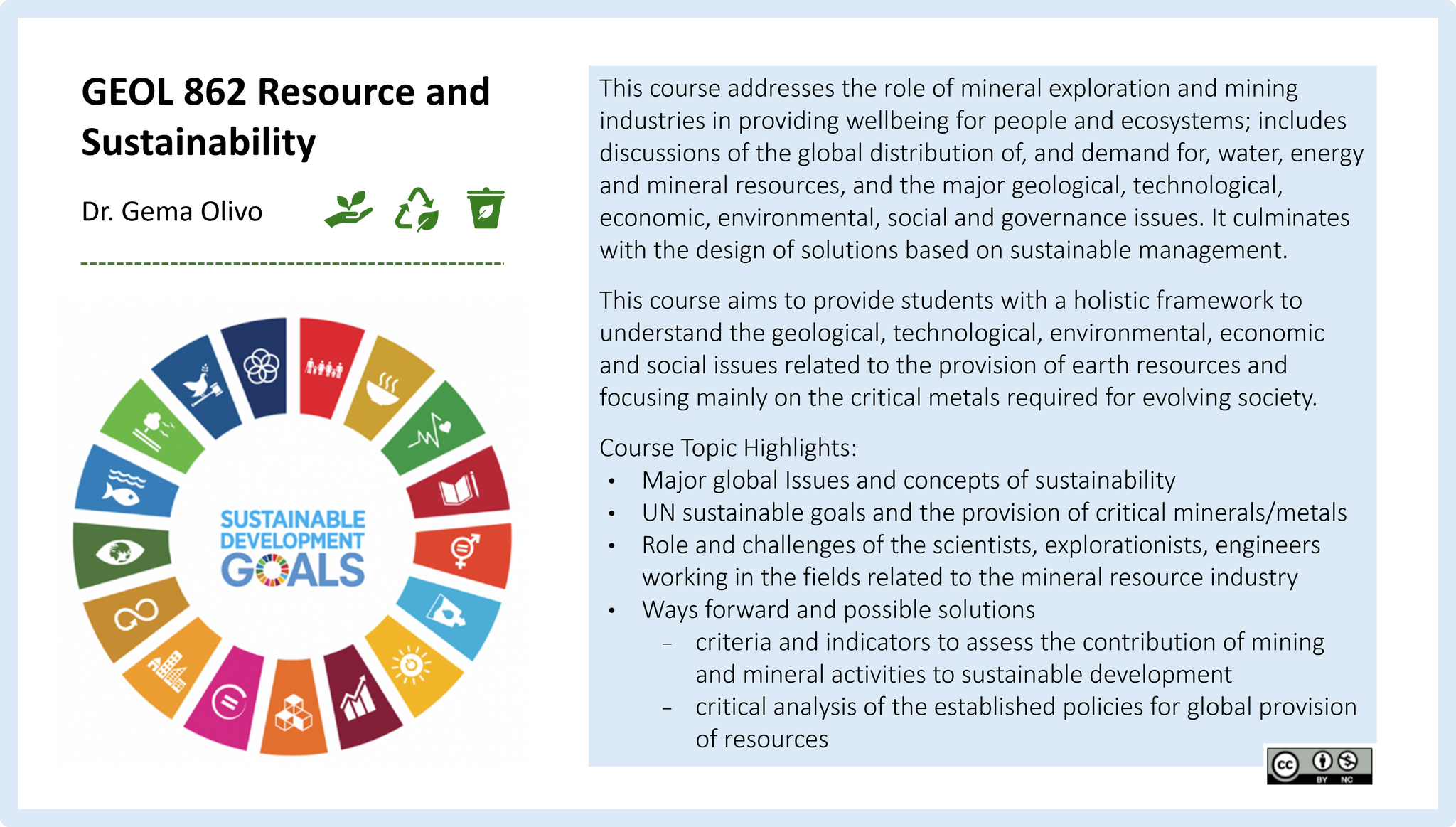
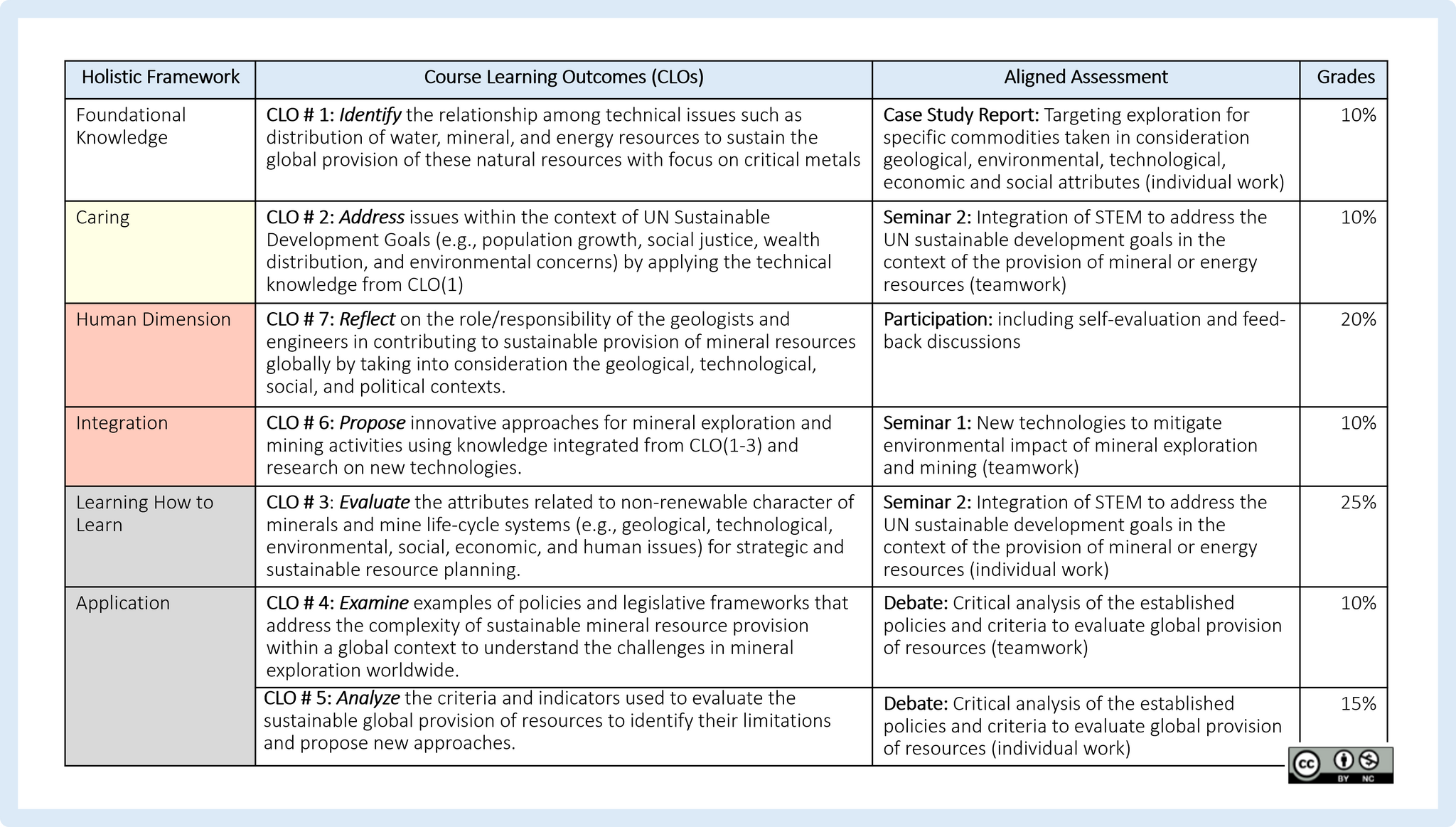
Please Note, the graphics, copyright Gema Olivo, Professor at the Department of Geological Sciences and Geological Engineering, Queen’s University, are shared under a Creative Commons Attribution-NonCommercial 4.0 International License. You can download them as a PDF: GEOL 862 Resource and Sustainability Graphics (198KB)
GEOL 862 Resource and Sustainability (PDF, 877KB)
This course syllabus, copyright Gema Olivo, Professor at the Department of Geological Sciences and Geological Engineering, Queen’s University, is shared under a Creative Commons Attribution-Non Commercial 4.0 International License. This syllabus can be downloaded by students in the course onQ site where all readings required in this course can be accessed.
I am keen on exposing teacher candidates to diverse worldviews about English language learners, including those that would challenge them (the teacher candidates) to rethink their pedagogical practices, positionalities, and philosophies… I recommend my fellow instructors and members of Queen’s teaching community to develop globally engaged curricula that centre diversity, equity, and justice, especially during these times when our world, especially the teaching-learning community, is increasingly being polarized by neoliberal ideologies.
Paul Akpomuje, Instructor of PROF 506 English Language Learners
My name is Paul Akpomuje, and I am a PhD student in the Faculty of Education. As a migration scholar, I have observed that migration-induced diversity in Ontario classrooms is growing in leaps and bounds. This requires every teacher to be equipped with the knowledge, skills, and attitude in supporting the fast-growing population of English Language Learners (ELLs) in Ontario—both Canadian-born and newcomers from other countries. To join others to address this challenge, I decided to apply to teach the course, PROF 506: English Language Learners. The course is designed to explore the relationships between English language learning and the learning of school contents through English in order to maximize the learning outcomes of students who are classified as ELLs.
Given the global context from which ELLs come, I was interested in curating the course in a way that will be different from what it has always been, and to centre criticality that will help teacher candidates challenge their positionalities and pedagogical orientations. More so, I sought to give the course a global appeal by situating discourses that will help teacher candidates think globally and act locally. To achieve this goal, I collaborated with Yunyi Chen, an Educational Developer at the Centre for Teaching and Learning (CTL), to make PROF 506 a globally engaged course using the Holistic Framework for Globally Engaged Curriculum.
I consider this collaboration a strategic one as I was keen on exposing the teacher candidates to diverse worldviews about ELLs, including those that would challenge them (the teacher candidates) to rethink their pedagogical practices and philosophies. I was also driven by the desire to support teacher candidates as they aim to foster cultural humility and centre pedagogical joy in their classrooms, and engage equitably with learners from different backgrounds. Since I am teaching in the Bachelor of Education program for the first time as a Graduate Teaching Fellow, I find the collaboration with the CTL extremely helpful as it offered me an important framework to develop my course syllabus in a way that aligned my course learning outcomes (CLO) with the topics covered on the course as well as with the learning assessments.
Working with Yunyi as we collaboratively developed the course syllabus was very productive. I find her mentoring approach very professional, yet extremely warm. For someone who has been in academia, and specifically in the Faculty of Education, for almost a decade, I find her strategy in developing learning outcomes very useful. Also, her approach impelled me to think more deeply and critically about the connections between what I intend to teach and what I really want to students to learn. This approach epitomizes student-centredness which is the core of the teaching profession. I have no reservation in recommending my fellow instructors and members of Queen’s teaching community to take advantage of this collective effort to develop globally engaged curricula that centre diversity, equity and, justice, especially during these times when our world, especially teaching-learning community, is increasingly being polarized by neoliberal ideologies.
The graphics below highlight key aspects of PROF 506, showcasing Paul’s implementation of the Holistic Framework for Globally Engaged Curriculum into his course work.
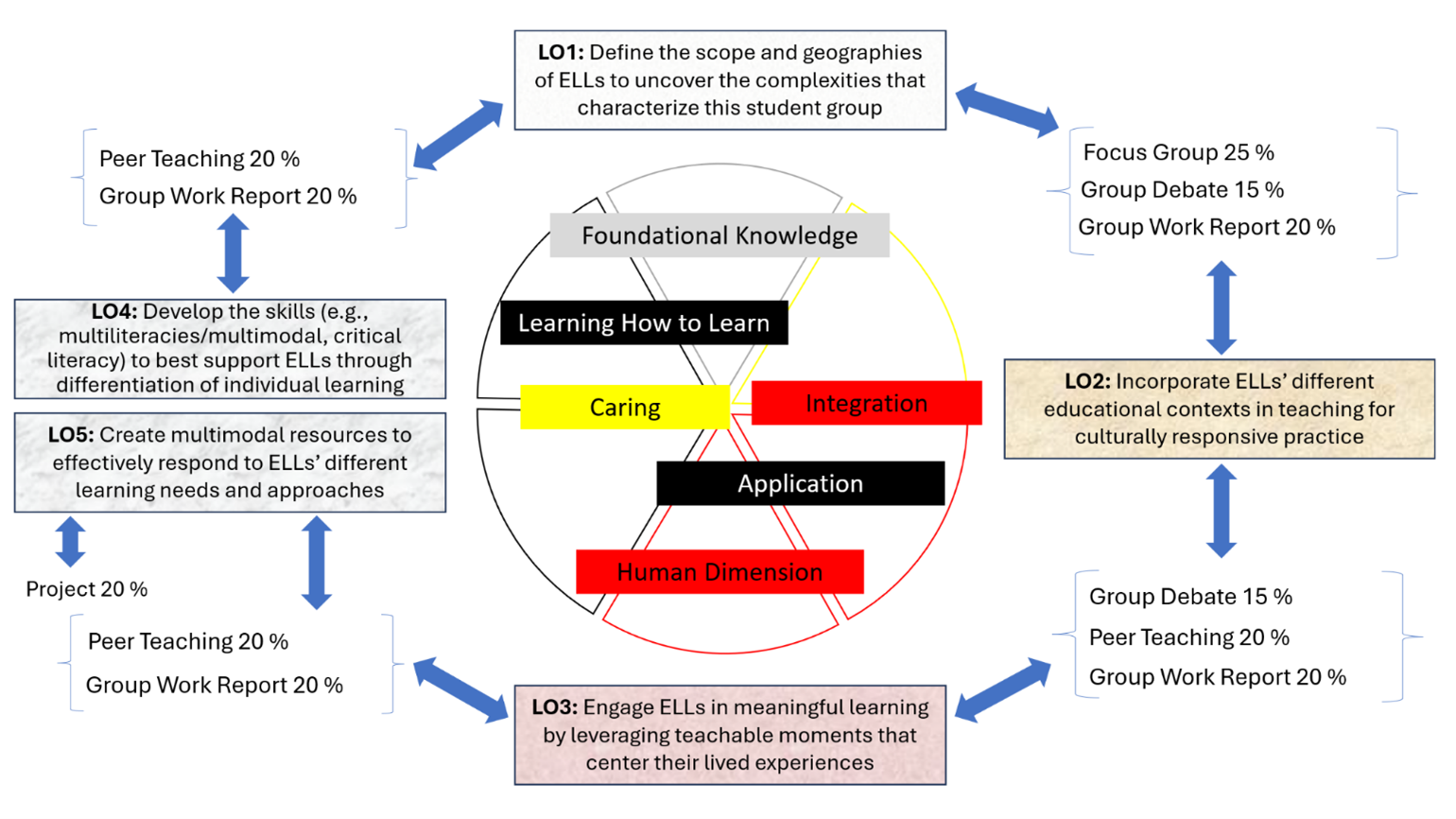
Please Note, the graphic, copyright Paul Akpomuje, Teaching Fellow at the Faculty of Education, Queen’s University, is shared under a Creative Commons Attribution-NonCommercial 4.0 International License. You can download them as a PDF: PROF 506 Graphic (PDF, 90KB)
PROF 506 English Language Learners (PDF, 262KB)
This course syllabus, copyright Paul Akpomuje, Teaching Fellow at the Faculty of Education, Queen’s University, is shared under a Creative Commons Attribution-Non Commercial 4.0 International License. This syllabus can be downloaded by students in the course onQ site where all readings required in this course can be accessed.
 This Creative Commons license lets others remix, tweak, and build upon our work non-commercially, as long as they credit us and indicate if changes were made. Use this citation format: Evaluation of Teaching. Centre for Teaching and Learning, Queen’s University
This Creative Commons license lets others remix, tweak, and build upon our work non-commercially, as long as they credit us and indicate if changes were made. Use this citation format: Evaluation of Teaching. Centre for Teaching and Learning, Queen’s University

